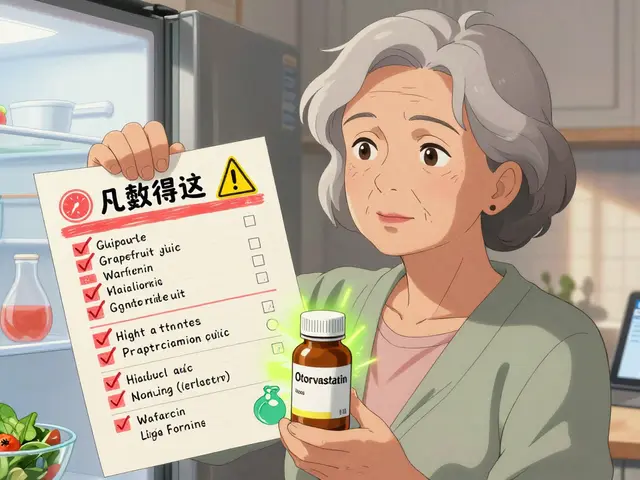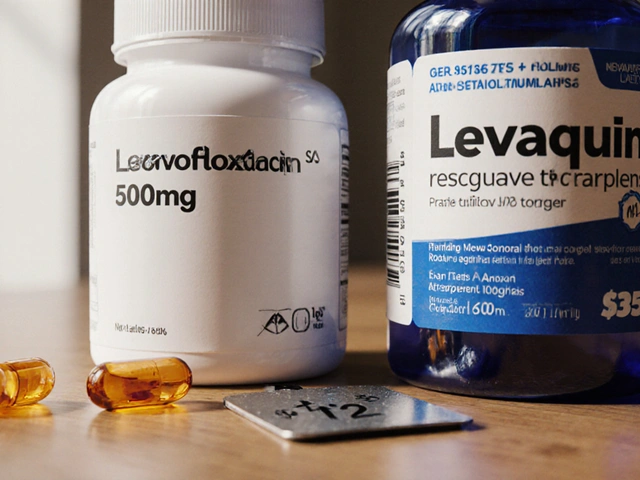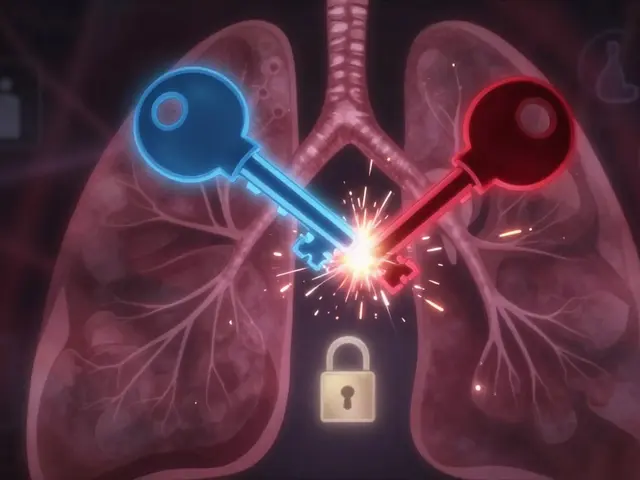Protein Distribution Calculator
How Protein Timing Affects Medication
For Parkinson's patients taking levodopa, protein can reduce medication effectiveness by 30-50% when consumed at the same time. The protein redistribution diet moves 70% of daily protein intake to dinner, giving your medication a better chance to work.
Your Protein Distribution Plan
For optimal medication absorption:
Why This Matters
By consuming 70% of your protein at dinner, you give levodopa a better chance to reach your brain when you need it most (during the day). Clinical studies show this can add up to 2.5 hours of 'on' time per day for Parkinson's patients.
Practical Tips for Success
- Take medication 30-60 minutes before meals - This gives it time to absorb before protein hits your system
- Choose low-protein snacks - Oatmeal, fruit, or rice cakes have under 5g protein
- Track protein in processed foods - A 'healthy' granola bar can have 7g protein
- Use meal-tracking apps - Helps avoid timing errors and track progress
- Consult your healthcare provider - Only 32% of neurologists routinely ask about protein intake
Many people don’t realize that what they eat for breakfast could be making their medication less effective. If you’re taking levodopa for Parkinson’s, or even certain antibiotics, the protein in your eggs, yogurt, or chicken breast might be blocking your body from absorbing the drug properly. This isn’t a myth or a guess-it’s a well-documented, clinically proven interaction that affects thousands of people every day.
How Protein Interferes with Medication Absorption
Protein-rich foods don’t just fill you up-they change how your body handles certain drugs. When you eat meat, fish, beans, or dairy, your digestive system breaks down the protein into amino acids. These amino acids flood your bloodstream, and suddenly, your body has to transport a lot more of them across the gut wall and into your brain. The problem? The same transporters that move amino acids also carry certain medications. Take levodopa, the main treatment for Parkinson’s disease. It’s designed to cross the blood-brain barrier to replace dopamine. But it uses the same transporters as large neutral amino acids like leucine, isoleucine, and tyrosine. When you eat a high-protein meal, those amino acids compete with levodopa for a ride into the brain. Studies show this can cut levodopa absorption by 30% to 50% in about 60% of patients. That means more tremors, stiffness, and ‘off’ periods-even if you’re taking your pill exactly as prescribed. It’s not just Parkinson’s drugs. Some antibiotics, like penicillin and amoxicillin, also get less absorbed when taken with protein. The reason? Protein slows down gastric emptying. Your stomach takes 45 to 60 minutes longer to empty after a high-protein meal, which delays when the drug reaches the small intestine where most absorption happens. This pushes back the time it takes for the drug to reach peak levels in your blood, reducing its effectiveness.Not All Drugs Are Affected the Same Way
The impact of protein depends on the drug’s classification. Scientists use the Biopharmaceutics Classification System (BCS) to group drugs based on solubility and how easily they cross membranes. Drugs in BCS Class I-like ibuprofen or atorvastatin-are highly soluble and permeable. They don’t care much about protein. You can take them with food or without. But drugs in BCS Class III, like levodopa, are highly soluble but poorly permeable. That means they rely heavily on transporters to get into your system. That’s where protein causes the most trouble. The same goes for some antiepileptic drugs, like gabapentin and pregabalin, which use similar amino acid transporters. The FDA started requiring food-effect studies for all new drugs in 2019. That means drug makers now have to test how their pills perform with both low-fat and high-fat, high-protein meals. The result? We now know more than ever about which drugs are sensitive to protein. But here’s the catch: most medication labels still don’t tell you. A 2024 European Medicines Agency review found that 61% of drug guides don’t mention protein interactions-even when the science says they should.Levodopa and the Protein Redistribution Diet
For Parkinson’s patients, the most effective strategy isn’t cutting out protein-it’s moving it around. The protein redistribution diet shifts 70% of your daily protein intake to dinner. That means eating light on protein during the day-breakfast and lunch-and saving the meat, cheese, and beans for the evening. Why does this work? Levodopa works best during the day when you’re active. By keeping protein low in the morning and afternoon, you give the drug a clear path to your brain. At night, when you’re resting, your body doesn’t need as much dopamine, so the protein interference matters less. Clinical trials from the Michael J. Fox Foundation show this approach adds 2.5 hours of ‘on’ time per day-time when movement is easier and tremors are under control. One patient, tracked with a wearable sensor, reported cutting their ‘off’ time from over five hours a day to just over two after switching to protein redistribution. That’s not a small change-it’s life-changing. But there’s a downside. If you cut protein too much, you risk muscle loss. A 2024 study in the Journal of Parkinson’s Disease found that 23% of patients on strict low-protein diets developed muscle wasting within 18 months. The goal isn’t to eliminate protein-it’s to time it right. Experts recommend 0.8 to 1.0 grams of protein per kilogram of body weight per day, with most of it at dinner.
What About Other Medications?
Levodopa is the poster child for protein interactions, but it’s not alone. Some antibiotics, especially those in the penicillin family, are less effective when taken with milk, eggs, or meat. The amino acids bind to the drug in the gut, reducing how much gets absorbed. Studies show absorption drops by 15% to 20% when taken with a high-protein meal. Thyroid medications like levothyroxine are also sensitive. While calcium and iron are the usual culprits, protein-rich meals can delay absorption too. The standard advice is to take it on an empty stomach, 30 to 60 minutes before eating. Same goes for certain osteoporosis drugs like alendronate. On the flip side, protein can actually help some drugs. High-protein meals increase blood flow to the intestines by 25% to 30%, which can improve absorption of drugs that rely on passive diffusion. For example, some antivirals and antifungals work better when taken with food. But unless the label says so, assume protein is a problem-not a help.Practical Tips for Managing Protein and Medication Timing
If you’re on a medication that’s affected by protein, here’s what works:- Take your medication 30 to 60 minutes before meals. This gives it time to absorb before protein hits your system. For levodopa, this is the gold standard.
- Use low-protein snacks if you need to eat with your pill. Oatmeal (without nuts or milk), fruit, or rice cakes have under 5 grams of protein. That’s usually safe.
- Redistribute your protein. Eat lighter meals at breakfast and lunch. Save chicken, fish, tofu, and dairy for dinner.
- Read labels on processed foods. A ‘healthy’ granola bar can have 7 grams of protein. That’s enough to interfere with your morning dose.
- Use an app. Apps like ProteinTracker for PD let you log meals and track protein intake. Users report 40% fewer timing errors.
- Ask your doctor or dietitian. Only 32% of neurologists routinely ask about protein intake. Don’t assume they know. Bring it up.
Why This Is Still Overlooked
Despite strong evidence, this issue is still ignored in clinics. The American Society for Nutrition found that 68% of doctors never discuss protein timing with patients starting levodopa. Why? It’s not that they don’t know-they’re busy. Diet advice feels like a ‘bonus’ task, not a core part of treatment. But for Parkinson’s patients, skipping this conversation can mean hours of unnecessary disability each day. Even worse, dining out is a nightmare. Restaurants don’t label protein content. A ‘grilled chicken salad’ might have 40 grams of protein. That’s more than half your daily limit. Many patients report avoiding social meals altogether because they can’t risk a bad reaction.What’s Next?
The field is changing. The FDA is working on a new ‘Protein Interaction Score’ label-similar to alcohol warnings-so you’ll see it right on the bottle. Pharmaceutical companies are already testing drugs with protein-sensitive profiles in Phase III trials. New delivery systems like Duopa, which pumps levodopa directly into the small intestine, bypass the problem entirely. And emerging research on gut bacteria suggests certain probiotics might reduce protein competition by 25%. By 2030, personalized algorithms could predict exactly when to take your meds based on your diet, activity, and even your microbiome. For now, the best tool you have is awareness. Know your medication. Track your meals. Talk to your doctor. And don’t assume that because your pill works sometimes, it’s working as well as it could.Your body doesn’t treat food and medicine as separate things. They’re part of the same system. And if you’re not managing them together, you’re leaving effectiveness on the table.








Write a comment
Your email address will be restricted to us